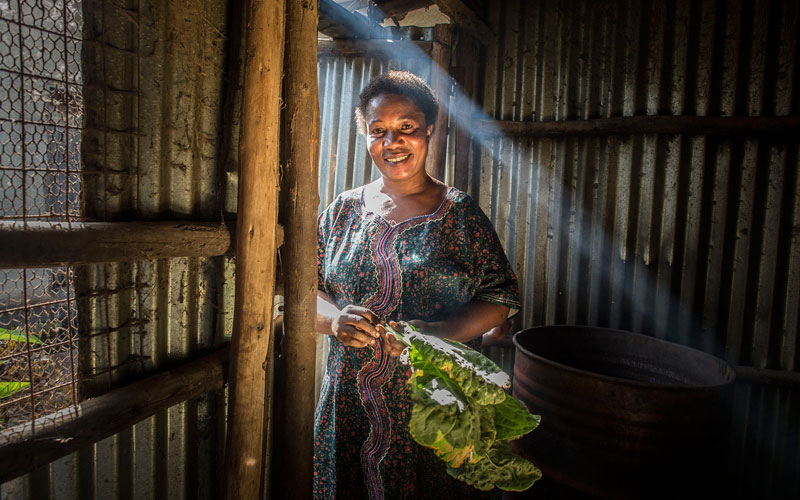For World Food Day, lessons from Uganda’s innovative urban gardener
 Harriet Nakabaale Photo: Ami Vitale / Oxfam America
Harriet Nakabaale Photo: Ami Vitale / Oxfam America
Hunger is about power. Its roots lie in inequalities in access to resources and opportunities. For Harriet Nakabaale, a sliver of land next to her house in Uganda’s sprawling capital, Kampala, has given her the power to ensure not only that her family is well fed, but that the community around her sees what’s possible when enterprise meets with even a little bit of opportunity. Nakabaale has turned a 50-feet-by-32-feet chunk of hard urban ground into an oasis of green, bursting with fruits and vegetables.
“I’ve learned that wherever you put soil, you could grow a crop there,” says Nakabaale, who was determined to save money in an expensive city by growing everything that she could as soon as she got a place of her own. That place is now called “Camp Green,” a backyard enterprise that mixes intensive gardening with community education on urban agricultural practices.
This week, Nakabaale will be a featured speaker at Oxfam America World Food Day events in the Midwest and on the West Coast, where she’ll share her experiences as an urban gardener and innovator.
“What is important is to eliminate poverty,” says Nakabaale.”I try to lead the way so other people could do the same.”
Respecting the land, our common ground
The real magic in Nakabaale’s story is in the immense productivity that’s possible when land—even a tiny sliver—is treated with respect and used with great care. On her small city plot, Nakabaale grows everything from herbs to fruits to root vegetables. She raises poultry. She makes briquettes. She composts and recycles. A single mother of two children, Nakabaale makes a living that not only ensures the well-being of her family through a healthy diet but has provided her with income to help cover other important expenses, such as school fees.
“Anywhere weeds can thrive, crops can grow there, too,” says Nakabaale. “In Africa, we get hungry because we don’t know what to do with the soil we have, the land we have. It’s very important to people in urban areas to use the small space they have. If they use it profitably, it would help you cut the cost of living in town, which is very high. If you don’t cut costs, you’ll always buy and be poor forever.”
Urban families are not alone in facing the challenge of food security. Hard-working small-scale farmers around the world grapple with access to land and other vital resources such as water and seeds. A key to ensuring the world has enough to eat is making sure that farmers can hold onto the land that feeds us all—our common ground.
Since 2000, nearly 800 large-scale land deals covering more than 81 million acres have been recorded. In the past decade, an area of land four times the size of Portugal has been sold off to foreign investors globally. The crops grown after these deals have gone through rarely provide sustenance to the people who live there: In fact, more than 60 percent of foreign land investors in developing countries intend to export everything they produce on the land. Two-thirds of agricultural land deals by foreign investors are in countries with a serious hunger problem.
But families in those countries shouldn’t have to face such devastating losses. And no one should go hungry. Our bountiful planet can produce enough food to feed every man, woman and child –if we stand together, and if we learn from the wisdom of farmers like Harriet Nakabaale.
Take action to support farmers’ land rights around the world: Tell Coca-Cola, PepsiCo, and Associated British Foods to make sure their sugar doesn’t lead to land grabs.
